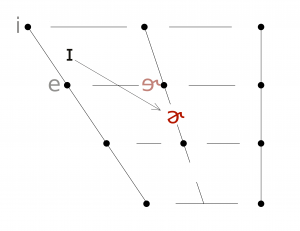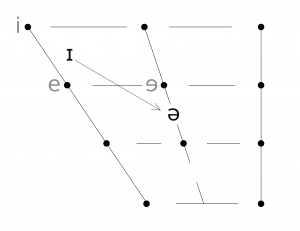19 The NEAR Lexical Set

The near lexical set is part of the group known as the Centring Diphthongs, which go from the edge of the vowel space towards its center, towards schwa, with or without r-coloring. In this case, the nucleus of the diphthong is comparable to fleece or kit, with values in the range of [i ~ ɪ]. Depending on accent, the offglide can go from a relatively close position [ɪɘ̯˞/ɪɘ̯] to [ɪɚ̯/ɪə̯], to—in some extremely affected (non-rhotic) cases—[jɐ ~ jɑ], such as a stereotypical, old fashioned British hyperlect, sometimes played as an “upper-class twit,” or army sergeant major.

In non-rhotic accents, it is possible for smoothing to occur to centring diphthongs, so that they become merely the value of their nucleus. This means that, in some non-rhotic accents, a word like here might be fully articulated in its dictionary form as [hɪə̯], but in rapid speech, it might be reduced to merely [hɪ]. Of the 5 centring diphthongs (near, square, cure, north/force, and start), both cure and near are fairly resistant to this smoothing process, while the more open centring diphthongs are either smoothed in all contexts already (e.g. north/force [ɔ] and start [ɑ]), or are in the process of becoming so (square [ɛ]).
In some accents, discerning whether something is near or not is further complicated in the environment before an intervocalic /r/ (an /r/ between two vowels). Here’s how to recognize the two context (we’ll use Received Pronunciation as an example accent here, but this complication can happen in many other accents as well.) When [i~ɪ] precedes an intervocalic /r/ there are two options.
- The first is kit on its own, as a speaker might have in a word like mirror, which is [ˈmɪɹə] in RP.
- The second is (of course) near, as you might have in a word like (ahem) nearer, [ˈnɪə̯ɹə], which is near Ⓒ.
In all cases where the kit vowel is preferred in these accents over near Ⓒ, the word is spelled with ‹i› or ‹y› as in Syria, spirit, mirror, squirrel*, lyrics, miracle, conspiracy, irritate, mirage, pyramid, syrup*. All the cases where near Ⓒ is appropriate have an ‹e› as part of the spelling, as in er-, eer-, eir-, ear-.
- 🕊 Free: does not require a following consonant, and can exist on its own
 A Centring Diphthong, that moves from the periphery towards the center (schwa).
A Centring Diphthong, that moves from the periphery towards the center (schwa).- in stressed and unstressed syllables
Spellings
Wells, in devising the near Lexical Set, created three subgroups that correspond to historical pronunciations. When accents split near, they tend to do so along these historical lines.
near Ⓐ: in Free syllables ‹eer, ere, ier, eir, ear›, as in beer, here, bier, weir, fear;
near Ⓑ: in Check syllables ‹erC, ierC, earC›, as in de Beers, fierce, beard;
near Ⓒ: before intervocalic /r/ ‹erV, eerV, eirV, earV›, as in period, eerie, Keira, nearest.
Wells also identified words not associated with a following /r/ (or even a vowel-formerly-known-as-/r/, as we get with non-rhotic accents), that are parallel to near; he called these near prime words. (If I was naming this group, I think I’d call it leah.)
near prime: without /r/, either in a free syllable, as in idea, Korea, Maria, pizzeria, or before /n, m, l/ Ian, Caribbean, museum, Liam, real, ideal.
In many accents near prime can break into two syllables, in other words fleece + comma; however, in rapidly flowing connected speech, they are frequently one syllable, regardless of accent, with [ɪə̯ ~ iə̯]. near prime can occur in Free syllables (with no following consonant), or with /n, m, l/. Perhaps Fiat is the rare exception with a following /t/? As you read the example words, ask whether you, in your personal accent, can make near prime one syllable, or whether they naturally break into two. If you’re used to breaking them, explore what it would take to make them as a single syllable. I find that if I put a little more stress on the nucleus of the diphthong, it’s easier let the schwa just be the coda, and not break into a new syllable.
near Ⓑ is very rare: there just aren’t a lot of words in this category. Apart from proper nouns like Pearce=Pierce=Peirce, Sears, Sheard, there are only the following: fierce, pierce, tierce, weird, beard. That said, there are quite a few words that are the past tense of verbs ending in -eared, like appeared, cleared, feared, smeared, or in –eered, like engineered, volunteered, veered, cheered.
Pronunciations
The near lexical set is pronounced with a close front vowel, completely unrounded, [ɪ ~ i], with an offglide towards the center of the mouth, [ɘ ~ ə ~ ɐ] for a non-rhotic accent, or [ɘ˞ ~ ɚ ~ ɝ] for a rhotic accent; in emphatic pronunciations, some accents allow for breaking into two syllables, for example [i.ə/i.ɚ] or even [ijə/ijɚ].
| Non-Rhotic | Rhotic | |||||
| close | mid | open | close | mid | open | |
| close | iɘ̯ | iə̯ | iɐ̯ | iɘ̯˞ | iɚ̯ | iɝ̯ |
| mid | ɪɘ̯ | ɪə̯ | ɪɐ̯ | ɪɘ̯˞ | ɪɚ̯ | ɪɝ̯ |
More heightened non-rhotic accents might allow [jɐ ~ jɑ], especially at the end of an utterance, as in Lady Bracknell from The Importance of Being Earnest: “Come over here, dear!” [kɐm əʊ̯vɐ ˈhjɐ ˈdjɐ], https://youtu.be/mVKTAcufqtQ⧉.
Note that some Southern US accents that have an offglide on kit [ɪə̯] may have a more extreme version for near [ijɚ].
There is a merger with square in New Zealand and East Anglia. Jamaica also has a square–near merger, before intervocalic /r/, as in serious, it’s [i.ɹ].
Personal Pronunciation: Preparation
Let’s begin by being clear on whether your accent is rhotic, or non-rhotic: do you pronounce /r/ after a vowel in words like beer or bar? If so, your accent is rhotic; if not, it is non-rhotic. Take a moment to say near with the opposite of your pronunciation to be sure: try adding r-ishness to the end if you’re non-rhotic, and take it away if you are rhotic. How did you do that? Adding an /r/ sound usually means a curling or bunching action of the tongue; taking it away means inhibiting that /r/ impulse and (usually) includes relaxing your nucleus towards a neutral vowel in the center of your mouth. Compare your personal value in near Ⓐ words, such as beer=bier, here, weir, fear with someone else’s and take a moment to think about how they do what they do, and how it is similar or different from your own pronunciation.
- As a non-rhotic speaker, you should be able to discern whether you use a single action monophthong for near, or whether you offglide to some kind of mid-central(ish) vowel. If you do have an offglide, what vowel do you have? I would expect values somewhere in the range of [ɘ ~ ə ~ ɜ ~ ɐ] for many speakers, but maybe it goes somewhere else?
- As a rhotic speaker, your offglide will have r-coloring. Try to figure out how open/close your offglide is, and whether it’s in the center of your mouth. Not only should you discern where in the vowel space your offglide sits, but also the degree of r-coloring you have. As the nucleus of near is so close, there is no room for rhoticity there; r-coloring is reserved for the offglide. Depending on the degree of r-coloring, you can add one or more “wings” to indicate how much you have: [iɚ̯ ˞ ˞]. (We’ll look at other, more fine-grained options for denoting rhoticity in the Alternate Pronunciations section below.)
Before we dig into the nucleus of your near diphthong, let’s just ascertain that you don’t have a merger with square. Are the following minimal pairs the same, or different? If they’re different, then you don’t have a merger; if they’re the same, you do!
hear=here/hair, we’re/ware, clear/Clair, rear/rare, fear/fair, sheer/Cher
Now, let’s just check—if you do have a merger, do the pairs merge as square? Let’s check: is the beginning of the diphthong they share somewhere close to the vowel in fleece or kit (so they’re merged as near), or is it closer to the vowel in dress or face (which would mean that they sound like square)? If they match with near, we say you have a near–square merger, which is more commonly occurring. If they match with square, you have the square–near merger, which is much rarer among accents of English, globally speaking.
If they match: you have a merger, and so the challenge for you is to explore trying out a new pronunciation. As well see later in this section, it’s fairly easy to identify through spelling which words belong in which set, so you probably won’t have as much trouble counteracting the effects of your merger when working on an accent where the two sets are distinct.
If they don’t match: you don’t have the near–square merger, and so you’re lucky that you have the instinctual ability to distinguish between the two sets.
Is Breaking an Option? Imagine an emphatic “Come HERE!” Does the diphthong in your speech break into two syllables? In more extreme situations, this will add a “yod” [j] between the nucleus and the offglide, as in [ˈhijɚ] in a rhotic accent, or [ˈhijə] in a non-rhotic one. You don’t have to have the yod when it breaks, though: consider the difference between a pier at the seaside, which is one syllable, and ‘someone who pees,’ a “pee-er,” with two syllables, but probably not a yod. Or the difference between (one syllable) near and the action of ‘kneeing her’ during a fight, “knee ‘er” with two. Might the words pier and near break into two syllables, when spoken emphatically in phrases like “Not the dock, but the pier,” or “not far, not close, but near;” could they break into two syllables as they do in “pee’er,” or “knee ‘er”? If so, in those cases we’d transcribe them with a syllable break dot, as in [ˈpi.ɚ] or [ˈni.ɚ].
Personal Pronunciation: Articulation Options
 ⚠︎ In my experience, when some people explore their near nucleus, they have a tendency to work in such an emphatic way that they go beyond their actual pronunciation to a kind of mental dictionary form, often in the realm of [i], even though they might normally pronounce the diphthong with a more “lax” pronunciation, that is more in the realm of [ɪ]. If you think this is the case for you, you might try recording your pronunciation of a word with near in the middle of a short phrase like “You got here quite quickly,” or “The mere idea of it.” Though we’re looking at the italicized word, chose to emphasize the underlined word, which will guarantee that you won’t overemphasize the near word we want to listen to! Then, with the recording in hand, you can use software to slow it down so you can listen carefully to your personal pronunciation of near.
⚠︎ In my experience, when some people explore their near nucleus, they have a tendency to work in such an emphatic way that they go beyond their actual pronunciation to a kind of mental dictionary form, often in the realm of [i], even though they might normally pronounce the diphthong with a more “lax” pronunciation, that is more in the realm of [ɪ]. If you think this is the case for you, you might try recording your pronunciation of a word with near in the middle of a short phrase like “You got here quite quickly,” or “The mere idea of it.” Though we’re looking at the italicized word, chose to emphasize the underlined word, which will guarantee that you won’t overemphasize the near word we want to listen to! Then, with the recording in hand, you can use software to slow it down so you can listen carefully to your personal pronunciation of near.Focus in on your nucleus now. Begin by exploring a couple of near Ⓐ words, such as here, year, we’re, rear, mere, tier=tear. Use an audio or video recorder to experiment on your own, or work with a classmate, friend, coach or teacher to identify how near in your speech compares with near in others’ speech. Try lengthening the beginning sound of your near vowel, and then attempt to subtly shift it around in the vowel space—up, forwards, down, and back—in tiny increments, before falling away to your offglide, whether it has r-coloring or not. As this diphthong begins in the most close front place, you should feel the top surface of the front of your tongue moving delicately up and down as you experiment while keeping your tongue tip behind your lower front teeth. Notice how the blade of your tongue moves towards/away from your alveolar ridge and hard palate, making more or less space in the front of your mouth. Take it to the extreme as well, making the most close/front sound possible, so that the narrowness of the space between your tongue and the gum ridge almost starts to cause turbulence: [i—j—i—j—i], and then fall off once more to your offglide. Explore the diagonal direction from [ə], slidinɡ through [ɪ] to [i], and go back and forth: [i—ɪ—ə—ɪ—i—ɪ—ə—ɪ—i]. Where is your starting spot? The beginning of near should have no lip rounding, and some speakers find that they have some, or even quite a lot of lip spreading, especially in emphatic pronunciations. Compare near with cure or start, and see how great the contrast is between the nuclei of these diphthongs.
Transcribing near: Decide which vowel symbol best suits the nucleus of your near Ⓐ subgroup: [i] or [ɪ] . Does it essentially have the vowel of fleece, [i], or kit [ɪ]? Is it more forward [i̟] or further back, [i̠]? Is it more mid-central [i̽]? Do you have an onglide scooping into it, as we might find in some Southern accents of the US? If so, where’s your starting point? [ə ~ ɪ ~ ɨ] seem like possible qualities to explore, as in [ə̯ijɚ] ear.
If your near nucleus is… (use whichever vowel symbol is appropriate for you)
- high, use the raised diacritic [ i̝ ], a small T pointing up
- open, use the lowered diacritic [ i̞ ], a small T pointing down
- pushed forward, use the advanced diacritic [ i̟ ], a tiny plus sign +
- pulled back, use the retracted diacritic [ i̠ ], a tiny minus sign –
- if you add lip-spreadinɡ, use the lip spreadinɡ diacritic [ i͍ ], a tiny two-headed arrow, which represents the lips spreading left and right
If you have a rhotic near diphthong, your coda might be
- close-mid central, so use an r-colored reversed-e, [ ɘ˞ ]
- mid central, so use an r-colored (or “flying”) schwa [ ɚ ]
- open-mid central, so use an r-colored turned epsilon (or “flying three”), [ ɝ ]
Alternate Pronunciations
Experiment with the near Word Lists, Phrases and Sentences with the following nucleus options:
For those wanting to explore a square merger, see The square Lexical Set for further options.
Off-glides: Now experiment with diphthongs that have off-glides that range from least open to most open [ ɘ˞, ɚ, ɝ ] for rhotic, and [ɘ, ə, ɜ, ɐ] for non-rhotic. Then, explore the offglides with a range of rhoticity, from no r-coloring to as much r-coloring as you can make, e.g. [ ⬚ɘ, ⬚ɘ˞1, ⬚ɘ˞2, ⬚ɘ˞3, ⬚ɘ˞4, ⬚ɘ˞5].
As you move the vowels in these directions, see whether that modified oral posture might inspire you to move the articulation of consonants and other vowels in the word in similar ways. Does it remind you of an accent other than your own?
Word Lists for near Ⓐin a Free Syllable, at the end of a word
-eer
-ere
-ier
-eir
-ear
Word Lists for near Ⓑ, sorted by the consonant that follows
PLOSIVES
-p
-b
-t
-d
-k
-ɡ
AFFRICATES
-tʃ
-dʒ
NASALS
-m
-n
-ŋ
FRICATIVES
-θ
-ð
-f
-v
-s
-z
-ʃ
-ʒ
-l/ɫ
-ɹ
-w
Words Featuring near prime in a Free syllable at the end of the word
Those words with /ɪə̯/ ~ /iə̯/ but without /r/
Words Featuring near prime with a following consonant
near prime only takes / m, n, l/
-m
-n
-l/ɫ
Short Phrases
- My career as an engineer.
- Clearly fearless.
- A pioneer in a bandolier.
- They persevered as a volunteer.
- Did you hear the Liberians cheering?
- Tears for Fears appeared in Tangiers.
- The grenadier guard looked severe.
- Is it weird to drink kirsch with beer?
- The cashier wore earplugs.
- These earphones are made with superior materials.
- There’s not even a veneer of truth: it’s merely hearsay.
- A yearly series of experiences.
- The mountaineer’s beard.
- Kirsten* fiercely bit her earlobe.
- The cheerless atmosphere.

Sentences
Level 1
Short with 2-3 words, underlined (near prime is double underlined)
- A seersucker suit doesn’t adhere to the dresscode.
- My big ears are to hear you with, my dear.
- They interfered with the superior yearling.
- She shed no tears for the broken souvenir.
- It’s a yearlong course on Kierkegaard’s theological works.
Level 2
Short with 4-5 words, underlined (near prime is double underlined)
- He theorized that Edward de Vere’s piercing gaze was none other than Shakespeare’s
- The society enriches the experiences of Nigerian students at Imperial College London.
- We squeed quietly, as we feared we were within earshot of our hero, Richard Gere!
- Seriously: I hope all feelings of dearness disappeared when he volunteered you for that job!
- On Netflix’s Cheer, La’Darius Marshall is a fearless cheerleader who is also Black and queer.
Level 3
Medium with 3-4 words, not underlined
- Invite your nearest and dearest over here for a beer.
- Clearly, the mere idea of more austere financial packages for grad students makes me sick!
- It is unclear whether his career as a “spear carrier” would disappear next season.
- The Piro tribe of New Mexico had been seriously harassed by the Apache by the year 1630.
- Keir steered the teardrop camper into the site just north of the clear-cut forest.
Level 4
Hard with 4-6 words, not underlined
- As I shifted gears, it appears that I veered into oncoming traffic, nearly causing an accident.
- For years I shopped with my peers at Sears, at the rear of the Galleria Mall.
- Maria told Liam that the new pizzeria and trattoria were near the IKEA.
- The guy at “Fierce Piercings” cheerfully speared my earlobe while I tearfully gritted my teeth.
- The brigadier general had a cavalier attitude towards the disappearance of the bombardier.
Mergers
near–square Merger: Sometimes called the chair-cheer merger, it can heard in New Zealand, East Anglia, the West Indies, Tidewater South Carolina, and in some (historical) accents of New York City. In New Zealand[1], in the early 1980’s, about 50% of speakers had distinct near and square Lexical Sets, while 19% of speakers spoke them as merged and sounding like square, and 32% of speakers said them merged and focused on near. By 1998, near had clearly won the battle: only 28% of speakers maintained a distinction, while 71% of speakers now used the near pronunciation, and only 1% used the square pronunciation for the merger.
In East Anglia, the two are traditionally merged in working class accents, though there may be still a very subtle, phonological difference where near is more open [nɛ], while square is slightly more close [ne].
Some New York City speakers in the twentieth century had a near–square merger with [ɪə̯], either in contrast with trap [æə̯], or in a 3-way bad-beard-bared merger with [ɪə̯].[2]
Though near in some southern regions of the US is more open, in the range of [ɛə̯/ɛɚ̯], often this is paralleled with a more open version of square with [æə̯/æɚ̯]. Meanwhile, in the Tidewater region of South Carolina, the merged near-Labov, W., (1966). The Social Stratification of English in New York City. Washington: Center for Applied Linguistics.square vowel is [ɛˑəˑ]. Some varieties of African American English also merge near–square with a vowel in the region of [eə̯].
Jamaican English has essentially the same vowel [eə̯] for its merger, though it depending on speaker status, mayLabov, W., (1966). The Social Stratification of English in New York City. Washington: Center for Applied Linguistics. be more or less rhotic. Trinidad is more likely to have less rhoticity on its merger, and to have no offglide, [e]. In Barbados, where rhoticity is standard across all levels of the accent, we get [eɚ̯] for its merger of near–square.
If you have this merger, then try to differentiate the near and square words in this sentence. Experiment with near/square pairs such as: [iə̯/eə̯, ɪə̯/ɛə̯, ɪː/ɛː, iɚ̯/eɚ̯, ɪɚ̯/ɛɚ].
-
- Clare wasn’t clear that she cut her fair hair here; that’s what I fear.
- The dear pair of Kieron and Karen dare to cheer from their chairs on the pier.
- “I swear I can hear a bear that way,” Jabby said as he steered us away from the woods.
- The cashier had to prepare to appear on a news story because of a recent lottery-ticket-winner-turned-billionaire.
- Even though they were scared, Valentina was proud to share she was queer after waiting many years to come out.
mirror–nearer Ⓒ Merger: Sometimes called the Sirius-Serious Merger, this merger is widespread in rhotic accents, especially in North America, where kit+/rV/, i.e. when the kit vowel is followed by an intervocalic /r/ plus another vowel, then merges with near Ⓒ, which also has an intervocalic /r/ plus a following vowel.
If you have this merger, then try to differentiate the mirror and nearer Ⓒ words in this sentence. Experiment with mirror/nearer Ⓒ pairs such as: [ɪ.ɹ/iɘ̯, e.ɹ/ɪɚ̯, ɪɾ/ɪ̽ɘ̯ɹ, iɹ/eɹ]
-
- Serious Sirius bought Meara a mirror in order to get nearer to her.
- While I peered at the pyramid backdrop, you were leering at the lyric tenor!
- I don’t believe in conspiracies, but after this spiritual experience, I’m seriously considering it.
- The music is interfering with my studying; I can’t listen to things with lyrics because it causes the severest irritation.
nurse–near Merger: In the Southern mountain speech of Appalachia, there is a parallel to the affected archaic RP hyperlect version of near [jɐ], which in this environment is the rhotic [jɝ]. This creates a relationship between near [jɝ] and nurse [ɝ], which is similar to the relationship between goose words like mew/moo, feud/food. However, when a consonant cluster or /tʃ/ precedes near in this accent, the jod is dropped, making a small group of words where nurse and near are merged. The Minimal Pair/homophones blurry/bleary, spur/spear, stir/steer, chur/cheer are the only ones I could come up with.
Examples of near words that would share the nurse vowel include: clear, steer, spear, query, sphere, smear, queer, sneer, dreary, cheerinɡ.
If you do not have this merger, try saying the list of words using [ɝ]. If you do have this merger, explore making them match with these near words that aren’t merged with nurse:
clear/leer, steer/tear (💧), spear/peer=pier, query/weary, sphere/fear, smear/mere,
queer/weir=we’re, sneer/near, dreary/dearie, jeering/cheering.
-
- Roman received earphones which were perfect for his music engineering course in university.
- I bought my friend earrings and a new purse to celebrate her first appearance on TV.
- After some weird interactions, the old employee just volunteered to be transferred to a different workshop.
Splits
There are no known Splits of the near Lexical Set.
Review
- Maclagan, Margaret A., and Elizabeth Gordon. “The NEAR/SQUARE Merger in New Zealand English.” Asia Pacific Journal of Speech, Language and Hearing, vol. 5, no. 3, Jan. 2000, pp. 201–207, doi:10.1179/136132800805576951. ↵
- Labov, W., (1966). The Social Stratification of English in New York City. Washington: Center for Applied Linguistics. ↵
A vowel that changes state, with a nucleus that begins on the periphery of the vowel space and moves toward a coda that is in the middle of the mouth, usually schwa /ə/. Here, we mean the sets NEAR, SQUARE, START, NORTH, FORCE, and CURE, whether they are rhotic or not. (US spelling: centering diphthong. )
Smoothing is the process whereby a diphthong becomes a monophthong, by having the coda or offglide be omitted. With centring diphthongs, the nucleus is then lengthened to about the same length as the diphthong used to take altogether. The opposite is "breaking".
When applied to a diphthong, "breaking" is a process where it becomes two syllables. When applied to a monophthong, it tends to mean diphthongization, where a mid-central schwa is added. The opposite is "smoothing"

